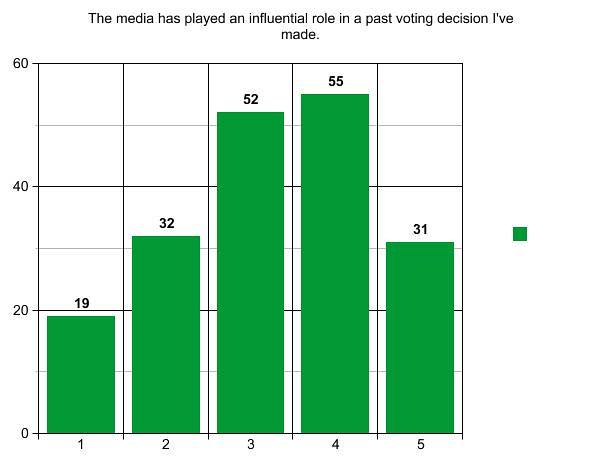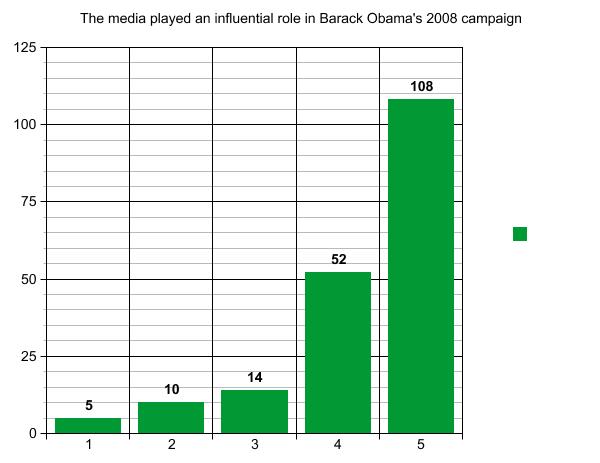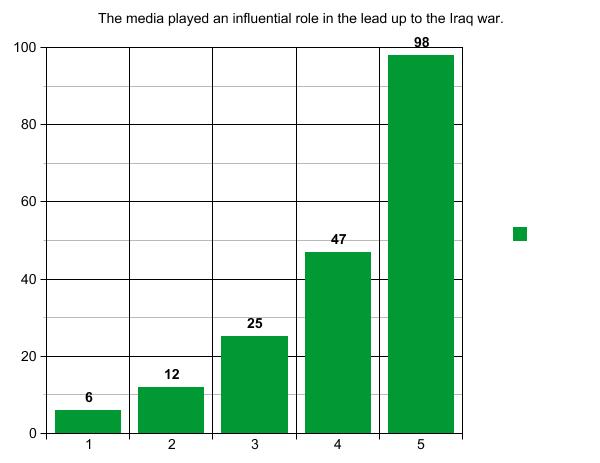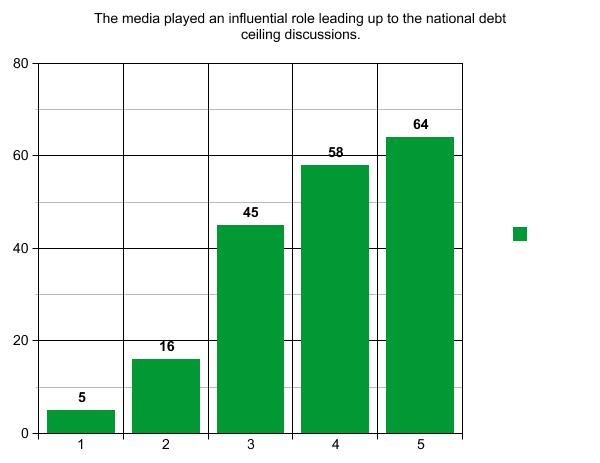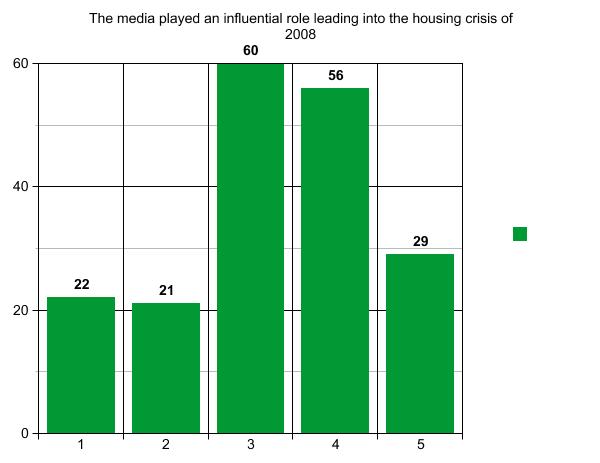“The medium is the message.” This is a saying to convey an idea that “the medium influences how the message is perceived.” At least, that’s according to Wikipedia. Ironically that this “comes” from Wikipedia….means something.
In our ongoing group of surveys on the media supported by the Whitman Institute we are looking at how media plays a role in our decision making. How we converse with each other, ourselves our national body politic and beyond through the media. You can take the latest Whitman Institute survey on Spot.Us. Not only will you inform our query about breaking news, you’ll earn $5 that can be applied to the news story of your choice. Hooray!
In this survey we asked you if and how the media has had an influence on the world. During the Obama campaign in 2008 there was a lot of discussion that the media played an influential role, swooning over Obama and attacking Sarah Palin. In the aftermath of the financial crisis of 2008 others believed the media played an influential role by ignoring tell-tale signs. That somehow the media was asleep at the wheel and this influenced the financial downturn.
Journalists often say that you cannot have a democracy without a healthy and independent media. That at its best good journalism can directly influence policy, voting decisions and more. There is a notion that journalism should comfort the afflicted and afflict the comfortable. We wonder if this ideal can be in conflict with the traditionally held view that journalism should be objective.
As always – Spot.Us is not, nor do we claim to be, a polling organization. That said, these are real answers from real people from all over the world including Japan and Guatemala. See the first Whitman Institute survey here and the second here.
We did find some of the results very curious and perhaps contradictory. It seems that when talking about ourselves we think the media has some influence. When asked if the media has influenced a voting decision, the answers between 1 (agree very little) and 5 (agree strongly) were spread out. But when asked how much influence the media might have on other’s – we place a little more agency.
We find a similar spread when asking how the media might influence the way one frames or talks about an issue.
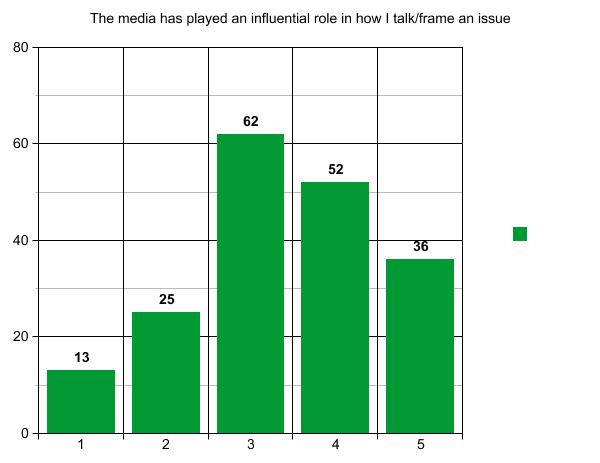
Certainly we acknowledge the media plays a role. But it seems somewhat even-handed. Yet when we discuss the influence the media may have had on “the masses” in their voting decisions we see a strong curve that shows a trend towards “strongly agree.”

We actually see similar trending charts around the media’s influence in the lead up to the Iraq war and the national debt ceiling discussion.
It is interesting to note that while the trends are the same, it was the strongest around the influence of the Barack Obama 2008 campaign. The sentiment that the media played a role and influenced people was the strongest around this event and the weakest around the national deb ceiling discussion.
But again, all three charts suggest a similar trend in the way we think the media influences external events, specifically how people see politicians and national affairs. Meanwhile, we believe the media has less influence over our own voting habits.
Sure enough there was one external event where our survey takers thought the media did not play an influential role. It was in the lead up to the housing crisis.
There is no right/wrong when discussing if and how the media should be objective. From past Spot.Us surveys we can see it is a dividing issue. Many would argue that objectivity in journalism is impossible and in full disclosure (ha!) I am one of them. I do not think it is wrong to strive for objectivity, just that it is a fool’s errand in part because one of the goals of journalism is to have impact and influence. Without probing too deep, we asked if these two forces contradicted. Unsurprisingly we found the Spot.Us community to be somewhat divided on the issue. About half do not see a problem. One quarter do see an inherent problem and another quarter are unsure.
Can the media be influential and objective at the same time.
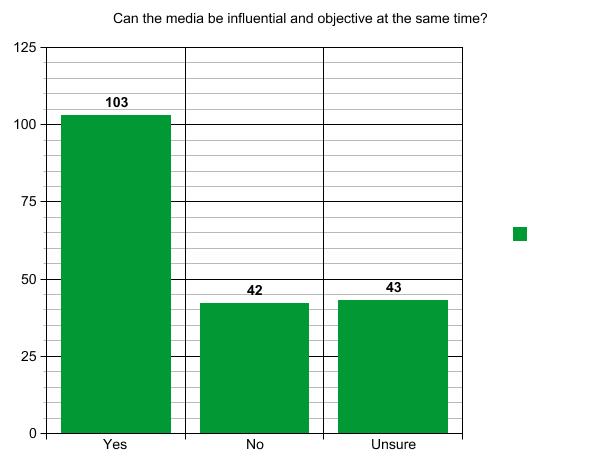
As we finish off most of our surveys we asked an open ended question. This allows us to get some anecdotal responses in addition to our analytical numbers. On par with the Spot.Us community there were more interesting responses than we could display. Below are some of the highlights. The responses below are anonymous and unedited.
“Television media is uniquely influential, and almost always negative in its effect. It lacks context, reporting, and hard-questioning.”
“The media can play an influential role if it wants to. We currently have a polemic media, in many countries not just the US. You could argue that this media landscape leads to heightened tensions between the political parties, that media influences not only the public but the political process too. In terms of the recent debt ceiling “crises” both sides played out their part for their supporters, as usual. In terms of actual events, this only pushes the problem back a bit, it also did nothing to stop the downgrading of the US.”
“Clearly this is a bad influence, on the positive side, the reaction to Katrina, Haiti, to Japan, to international and national events that require the mobilisation of people is to be lauded. I doubt that the media influence happens too often, it certainly is not never. Perhaps we are now more aware of this influence, from politicians down to the public. We also have a public that can self-broadcast so more examples of influence are reported.”
“I’m not sure how “played an influential role” is defined. I certainly pay attention to the media–what’s reported–and consider what the main players (Congress, the President, etc.) are saying and doing. I pay very little attention to the “talking heads” and their interpretation of the issues. I do listen–I’m intellectually curious–but just because some commentator on Fox or MSNBC believes a certain way doesn’t really affect me. Also, many non-media people have a tendency to want to “kill the messenger.” For example, I’m also a Realtor. I’m amazed at how many real estate agents blame the media for the poor real estate market. Yes, the media are reporting on it, and sometimes oversimplify issues. But the fact that people aren’t buying, the fact that housing prices in some areas have declined 30%-50%, the fact that foreclosures and short sales are up sharply–all that has virtually nothing to do with the media. Yet many agents really seem to blame the media for the poor condition of the market.”
“Speaking as a journalist, I don’t believe that the media CAN be objective. Everything from which stories are covered and in what light, to which experts are called in to comment frame the way the public will view an issue and the reasons behind those decisions are almost never objective. I think the best we can hope for is media that is honest and accountable for their coverage but sadly that happens way too little—especially on television.”
“I live in Japan, and I see that many Japanese people are way too easily influenced by the media on everything from what they eat, what they want and and what they think. It’s almost like people have stopped thinking. Many people confuse that information from the media is their own opinion. There are a lot of not very wise talk show hosts and university professors who talk blindly and people believe them. I think it is very scary. Media is man made, and subjectivity of the journalist is never to be avoided. I think we all need to realize that.”
“I don’t think it’s bad that the media is influential, if it is in fact media that you are watching/reading/listening too. If someone listen’s to only Rush Limbaugh or watches Keith Olberman and think that because they are on a news station, that it is news, that’s a problem. Today there are so many different media outlets, it’s important to check out more than one, so that you are sure you’re getting the whole story. I live in Boston where the Globe and Herald cover stories differently. I like to read both, because some details that are in one might not be in the other.”
“The media ALWAYS plays an influential role. People believe what they read and hear. People adopt what they read and hear as their own opinion. Most people prefer to be among the majority rather than the minority, so if the media present one side of an issue as the majority view (whether or not it really is), people adopt that view and it in fact becomes the majority view.”
“I think if you get your information from the media, they in turn play an influential role period. I think that when it is honest, unbiased media, then it is a positive thing. However, media these days are often accurate and unbiased. A lot of people go around quoting incorrect and bias information and it is very harmful!”
“In Guatemala, it is mostly bad. The media is controlled by a few powerful groups, it is only through alternative sources that one can get some balance.”
